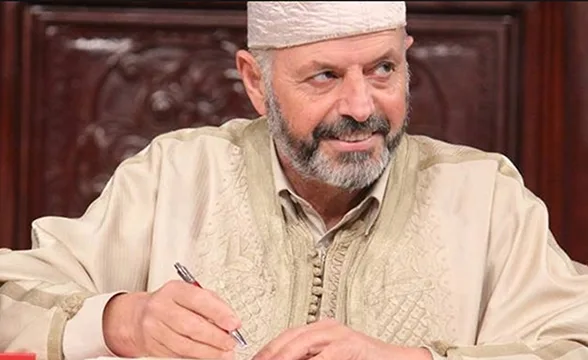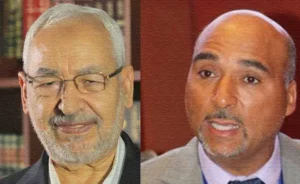July 7, 2025 – Habib Ellouz’s deteriorating health and detention conditions:
Habib Ellouz, a 71-year-old Ennahdha leader, has been detained pending trial (since March 2023) despite suffering from serious health problems that worsened during his detention.
Habib Ellouz, a former MP and member of Ennahda’s Consultative Council, is suffering from a critical health condition during his current detention. He suffered a stroke during his detention, resulting in loss of hearing and a severe deterioration of his vision. Ellouz is now wheelchair-bound and virtually unable to attend his trial.
In a hearing held by the Fifth Criminal Chamber on June 24, 2025, in what is known as the “Conspiracy Against State Security 2” case, Ellouz appeared on a television screen from prison and complained to the judge that he “can no longer hear and can barely see properly,” demanding that someone explain to him what was happening in the session. His words reflected his complete inability to engage with the trial due to his health impairment resulting from the stroke. However, the court ignored this urgent plea, shocking the defense team.
Ellouz’s deteriorating health was not entirely surprising; his lawyer, Ines Harrath, had warned more than a year ago of the seriousness of his condition. In March 2023, Harrath revealed that Ellouz, an elderly man, had suffered a “mild stroke” during his detention in Bouchoucha and a sharp rise in blood pressure. She noted that he had exhibited frightening symptoms, such as numbness in his arm and leg on one side, which prompted consideration of hospitalization. However, the authorities’ insistence on handcuffing him during his hospital transfer prevented this, as Ellouz categorically refused to be shackled out of respect for his dignity and his status as a political prisoner, not a criminal. He even threatened to go on a hunger strike until death when the prison administration tried to force him to shave his beard and remove his traditional cloak—actions he considered a deliberate insult to him as a religious political prisoner.
During the final hearing, the abuses against Ellouz escalated. In addition to the judge ignoring his request for an explanation, Ellouz was unable to see or hear his lawyers or the defense arguments clearly due to the remote trial technology. Lawyer Ines Harrath, a member of the defense team, stated that defendants being tried via videoconference “only see the judges’ bench on the screen, and neither see their lawyers nor hear their arguments” due to the absence of microphones to transmit the lawyers’ voices. Harrath described these conditions as rendering the lawyers’ presence “meaningless,” as it is impossible for their clients to follow the proceedings or communicate with them. In the face of this farce, Harrath announced her withdrawal from defending Habib Ellouz during the session in protest of what she described as a “disgrace” and “unreasonable trial conditions” that lacked the minimum requirements for a fair trial. She documented the details of her withdrawal, telling the judge in front of the audience, “This is not a trial,” and demanding that the reason for her withdrawal be documented in the minutes, namely that her client “cannot hear, can barely see, is unable to follow the trial remotely, and does not understand what is happening.” The court ignored the substance of this legitimate protest, prompting the remaining lawyers to request an adjournment of the session, given the impossibility of a defense under such circumstances.
The continued trial of an elderly man who is practically deaf and blind via videoconference—instead of bringing him into the courtroom and providing for his special needs—represents a flagrant violation of his dignity and fundamental rights, in addition to posing a threat to his already deteriorating health.
The Observatory urges the Tunisian authorities to:
- Immediately release Habib Ellouz, or at least suspend his trial until he recovers, given the seriousness of his health condition and his current inability to follow the judicial proceedings. The law allows for medical release or postponement of trials for humanitarian reasons, and there is no justification for keeping him in detention while he is unable to hear or see properly.
- Provide urgent and appropriate medical care to Ellouz, including transferring him to a specialized hospital if necessary, and ensure he receives effective treatment to restore his health capabilities as much as possible. His personal choices and dignity must be respected during care, and no humiliating treatment must be imposed as a condition for treatment.
- Respect fair trial guarantees for all defendants in politically motivated cases by enabling them to be physically present before the court and to communicate directly with their lawyers, and by providing conditions that ensure they are heard and understood during the hearings. The use of remote trials as a means of politically isolating defendants or restricting their right to a defense must be stopped.
- An independent and impartial investigation must be opened into the allegations of medical negligence and ill-treatment that Habib Ellouz suffered during his detention, and anyone found responsible for any negligence or violation of his rights must be held accountable. Failure to hold them accountable encourages further violations and undermines confidence in the justice system.
- Adhere to the Tunisian Constitution and international conventions in dealing with all political prisoners, and restore respect for the rule of law. This includes respect for Article 25 from the Constitution, which protects human dignity and prohibits torture, and Article 36, which guarantees humane treatment for prisoners, as well as Article 43 on the right to health. Adhering to these provisions is not a privilege, but rather a constitutional duty that the state must adhere to under all circumstances.
- The Freedom for Tunisia Observatory holds the judicial authorities, the prison administration, the Ministry of Justice, the Ministry of the Interior, and the President of the Republic, in his capacity as head of the executive branch, fully responsible for Habib Ellouz’s critical health situation. The Observatory calls on these bodies to urgently review their policies regarding political prisoners, ensuring respect for human dignity, providing fair trial conditions and adequate healthcare, and putting an end to the systematic ill-treatment that has affected a number of opposition figures since July 2021.





